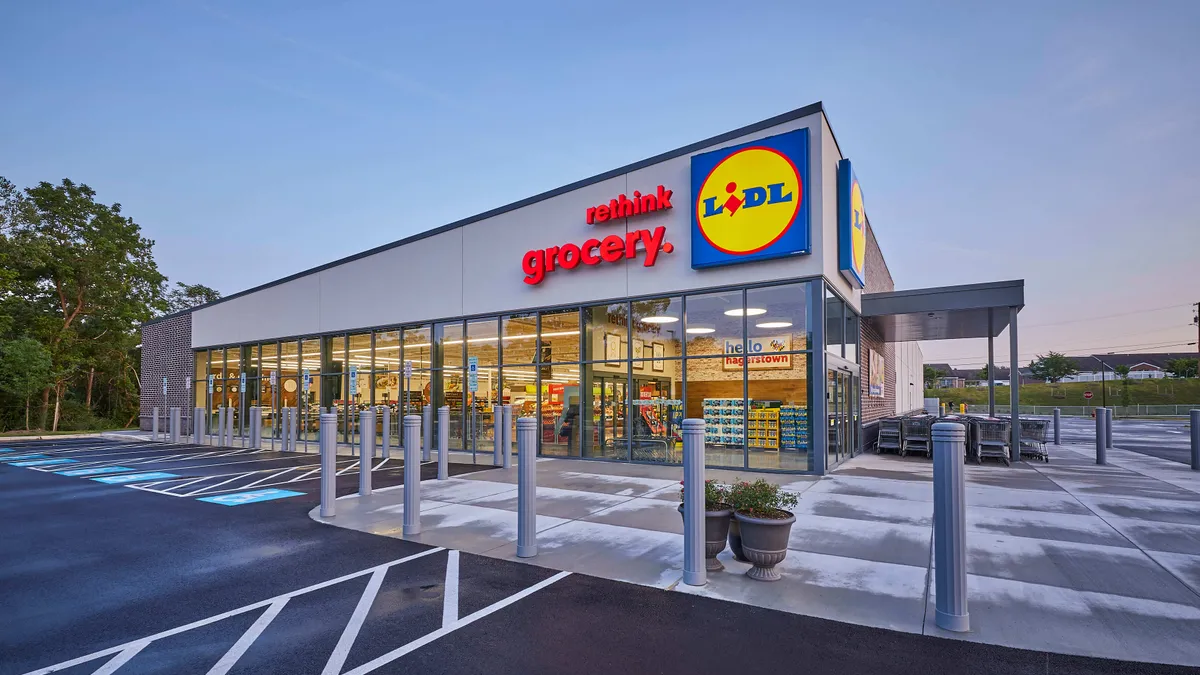Dive Brief:
- The arrival of German discount food retailer Lidl in four Long Island communities in late 2019 and early this year prompted competing grocers to significantly cut their prices for a range of common goods, according to data released Wednesday by the University of North Carolina's Kenan-Flagler Business School.
- Aldi reduced list prices for the items by about 15% following Lidl’s opening of its first four Long Island stores, the most among the retailers included in the study, which was commissioned by Lidl but conducted independently by the university. Walmart and Costco both responded to Lidl’s entry into their markets with price cuts of more than 8%.
- Researchers collected data for the study by comparing prices charged by eight grocery chains for an assortment of 47 grocery items, including fresh seafood, frozen pizza, soup and bread. Other retailers included in the study were Trader Joe’s, Target, Stop & Shop and King Kullen, and BJ’s Wholesale Club.
Dive Insight:
With only about 100 stores across the U.S., Lidl remains a small but expanding player in the country’s grocery market. But the University of North Carolina (UNC) study reiterates that when the German discounter puts down roots in an area, rivals have little choice but to take notice.
In March, just before the pandemic began, the researchers looked at prices at 27 stores serving the Long Island communities where Lidl opened its first area stores and found that Lidl’s prices were sharply lower than what its competitors charged.
At the time, the company’s prices for the basket of 47 items the researchers looked at were almost 45% lower than those at Trader Joe’s, the largest disparity among the grocers in the study. Lidl’s prices were almost 40% lower than those charged by King Kullen, and just under 34% below prices at Stop & Shop — two Long Island competitors that recently called off their merger.
Notably, Lidl’s impact on prices was greater than that of discounting king Walmart when it enters a new market, the UNC researchers found. Walmart itself lowered list prices on the items in the study by more than 8% in response to Lidl’s arrival on Long Island, putting it in line with the German retailer.
The four Lidl stores that were part of the study are part of a wave of new stores the company is planning to open on the East Coast. Lidl, which acquired 27 Best Market locations in 2018, expects to open four more Long Island stores this summer.
The findings echo the results of another independent study Lidl commissioned in 2018. That study, which was also conducted by UNC researchers, also found that Lidl exerts a price impact on private label items that outweighs that of Walmart.
Katrijn Gielens, the UNC marketing professor who led both studies, said the basket of common items the researchers used to benchmark Lidl’s prices on Long Island is a good gauge of how food retailers are jockeying for price supremacy amid fast-rising food prices.
“Those are the [products] where they will make the biggest mark, because those are the ones that you use to attract consumers to the store ... and where you cannot afford to be perceived as more expensive,” she said Wednesday during a conference call with the media.
Lidl’s reputation for charging low prices — and its apparent ability to goad other retailers to follow its lead when it enters their turf — doesn’t necessarily guarantee its success as it looks to expand its presence in the United States, where Aldi already has close to 2,000 stores.
The retailer has struggled to define itself with price-sensitive consumers, who have a stronger view of Aldi as a discounter, according to dunnhumby’s 2020 Retailer Preference Index. Lidl also has ground to make up when it comes to the assortment of items it sells, dunnhumby noted.













